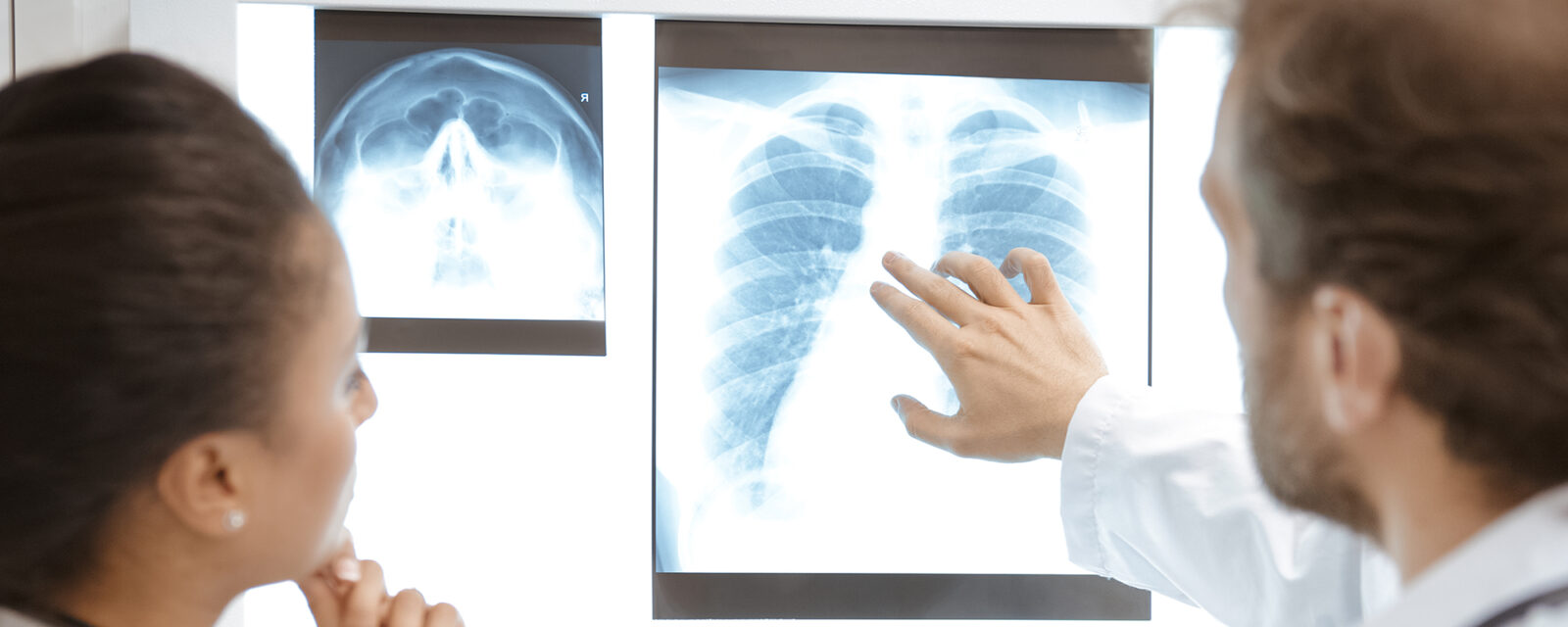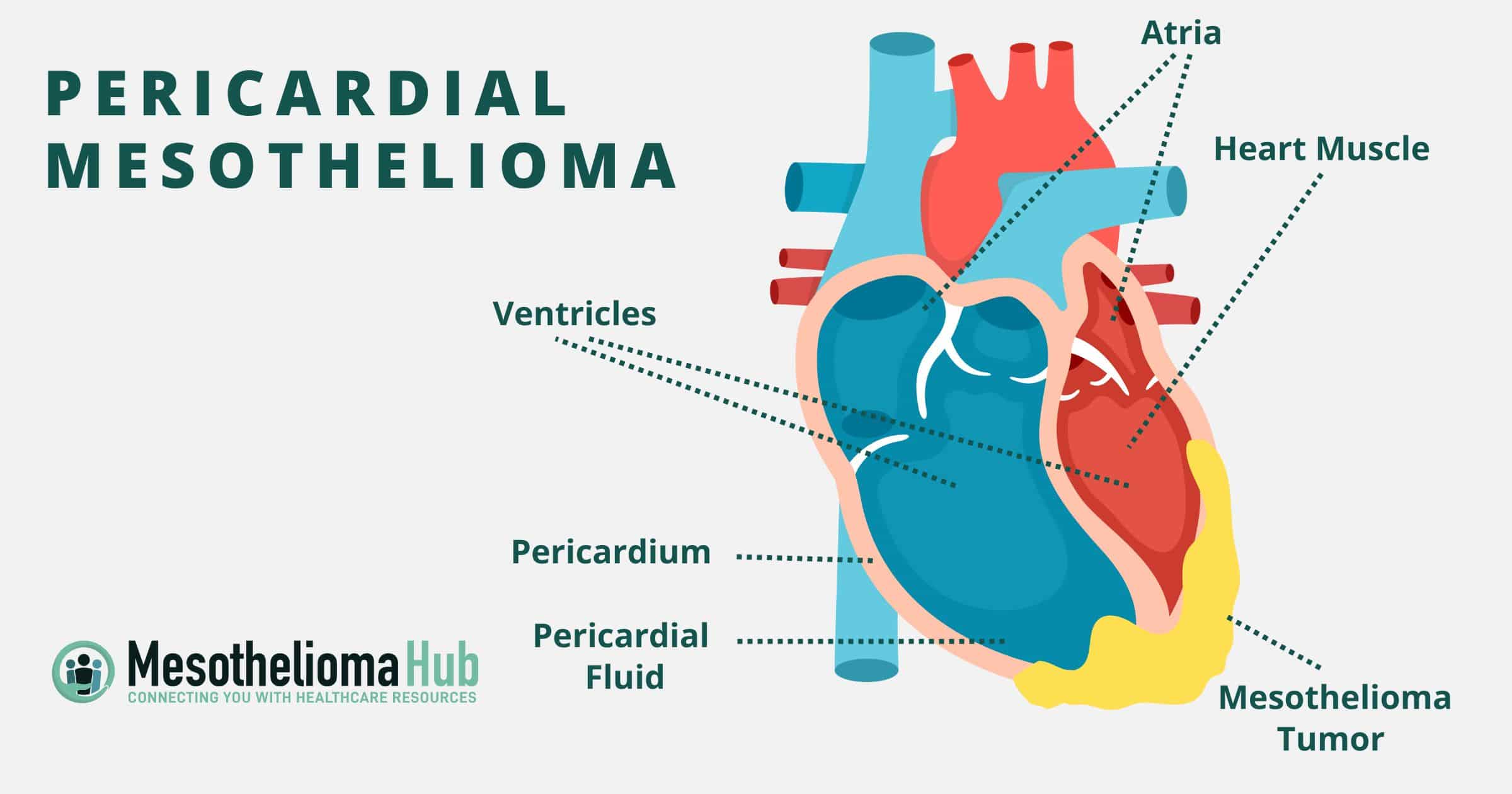
Medically Reviewed by: Muaiad Kittaneh, MD, FACP, MBA | May 18th, 2020
Tumors that develop in the pericardium grow in the tissue that surrounds the heart. This is also known as pericardial mesothelioma and is the rarest of all three types. Asbestos is the primary cause of pericardial mesothelioma when small asbestos fibers enter the nose or mouth through inhalation or ingestion and get stuck in the tissues lining the chest cavity. Once asbestos is stuck, the fibers will irritate surrounding tissues for several years until a tumor develops. Since the heart is in a space that’s difficult to reach, diagnosing and treating the illness can be hard to do.

Understanding the causes of pericardial mesothelioma is very important for patients and families affected by this rare form of mesothelioma. While the exact causes remain complex, medical experts primarily attribute this disease to the inhalation or ingestion of asbestos fibers. Once these microscopic fibers become lodged in the pericardium—the protective sac surrounding the heart—they can cause irritation and inflammation, leading to the formation of scar tissue and, eventually, cancerous tumors. However, it’s important to note that pericardial mesothelioma is not solely linked to asbestos exposure; factors such as genetic predisposition, compromised immune systems, prior radiation exposure, and systemic inflammation can also contribute to the risk of developing this condition. In the sections that follow, we will delve deeper into these causes, symptoms, and treatment options, providing essential information for those navigating this challenging diagnosis.
The symptoms of pericardial mesothelioma can vary widely but often resemble those of other heart conditions, such as heart disease or cardiac inflammation. Being aware of these symptoms can you give you a leg up in your prognosis, especially for individuals who may be at risk due to prolonged asbestos exposure. The primary symptoms associated with pericardial mesothelioma include:
Additionally, some patients may experience pericardial effusion, which is a buildup of fluid around the heart. This condition can lead to increased chest pain and further difficulty breathing. Pericardial effusion often necessitates treatment, typically performed as an outpatient procedure to relieve pressure on the heart. Recognizing these symptoms early will help you in obtaining a proper diagnosis. If you or someone you know is experiencing any of these symptoms, it’s important to consult with a healthcare professional for further evaluation.
Diagnosing pericardial mesothelioma can be particularly challenging due to its symptoms resembling those of other heart conditions, such as heart disease. If you suspect you may be at risk, understanding the diagnostic process is crucial. Healthcare providers typically use a multi-faceted approach that combines various diagnostic tools, including:
Given the complexity of diagnosing pericardial mesothelioma, it is of the most importance to work closely with a healthcare specialist familiar with asbestos-related diseases. Early detection can also significantly impact treatment options and outcomes, so if you exhibit symptoms or have a history of asbestos exposure, seek proper medical advice.
The two other types of mesothelioma, pleural and peritoneal, are more common and therefore easier to diagnose, especially if the patient knows they were directly or indirectly exposed to asbestos. Patients with malignant pleural and peritoneal mesothelioma sometimes have options for curative treatments that can extend their lives, particularly when they are diagnosed at stage 1 or 2.
Unfortunately, pericardial mesothelioma doesn’t have a formal staging system. This form of asbestos-related cancer is so rare it is usually diagnosed on the operating table or after death. Oncologists gauge the severity of the disease based on the size of the tumors that appear on the pericardium and whether or not those tumors can be surgically removed. When there is a formal diagnosis, the estimates are often based on general cancer-staging guidelines.
Pericardial mesothelioma is an exceptionally rare form of mesothelioma, accounting for less than 1%-2% of cases. Unfortunately, many patients are diagnosed only after surgery or at an advanced stage, complicating treatment options. The prognosis for this disease is generally poor, with most patients surviving less than one year post-diagnosis due to factors such as late detection, the aggressive nature of the cancer, and limited treatment options. Many patients may only access palliative care aimed at alleviating symptoms rather than curing the disease. It is crucial for those diagnosed to consult a specialized healthcare team, as early intervention can improve quality of life and manage symptoms more effectively. Exploring clinical trials may also provide access to emerging therapies that could offer hope for better outcomes.
Patients who do receive a formal diagnosis of pericardial mesothelioma may have some treatment options to explore. Pericardiectomy is a commonly used procedure in which a portion of the heart lining is removed. It is often followed by a course of chemotherapy, usually with a drug called Cisplatin. Pericardial mesothelioma patients can now receive financial assistance through the Social Security Administration (SSA).
Those diagnosed in the later stages of mesothelioma can take advantage of palliative treatments. Specific types of chemotherapy can slow the growth of tumors, helping to ease pain and improve breathing. During a procedure called pericardiocentesis, a doctor uses a needle and catheter to remove excess fluid buildup around the heart lining. In a similar operation called percutaneous balloon pericardiotomy, a balloon is attached to the end of the catheter. As the balloon inflates, it creates tiny holes in the pericardium, allowing more fluid to drain from the effusion.
If you or a loved one is facing a diagnosis of pericardial mesothelioma, time is of the essence and reaching out to a trusted source to explore your treatment options and rights must be done as soon as possible. Contact us today to connect with experienced healthcare professionals who can guide you through the treatment process. Additionally, our dedicated legal team is here to help you seek compensation for asbestos exposure. Don’t navigate this journey alone—reach out now for the support you deserve.
Elizabeth works with the advocate team to write about asbestos exposure and mesothelioma, aiming to raise awareness. She is committed to supporting families in the mesothelioma community.

Dr. Muaiad Kittaneh, MD, FACP, MBA, is a medical oncologist and assistant professor at Loyola University of Chicago. His journey in healthcare includes Internal Medicine training at Advocate Christ Medical Center/University of Illinois of Chicago, where he excelled as Chief Resident. Dr. Kittaneh further honed his expertise at the University of Miami.
Dr. Kittaneh has conducted extensive research and assisted in many clinical trials. His notable contributions have been published in journals across the United States, which focus particularly on breast, melanoma, and gastrointestinal cancers. As an expert medical reviewer, Dr. Kittaneh plays a crucial role in shaping and evaluating Mesothelioma Hub’s content, ensuring accuracy and relevance in the field.
American Cancer Society. (2018). About Malignant Mesothelioma. Retrieved on July 19, 2018, from https://cancer.org/content/dam/CRC/PDF/Public/8733.00.pdf
Cedars-Sinai. (2019). Cardiac Tamponade. Retrieved on September 14th, 2018, from https://cedars-sinai.org/health-library/diseases-and-conditions/c/cardiac-tamponade.html
Mayo Clinic. (2019). Mesothelioma. Retrieved on September 30th, 2019, from https://mayoclinic.org/diseases-conditions/mesothelioma/symptoms-causes/syc-20375022
Sardar, Muhammad Rizwan; et al. (2012). Primary Pericardial Mesothelioma Unique Case and Literature Review. Retrieved on September 14th, 2018, from https://ncbi.nlm.nih.gov/pmc/articles/PMC3384041/
Seal, Steffan, and Simon, Henry. (2021). Primary Pericardial Mesothelioma: A Rare but Serious Consideration. Retrieved from https://ncbi.nlm.nih.gov/pmc/articles/PMC3697233/Retrieved October 4th, 2024.
Volk, L; et al. (2018). Pericardial Windows Have Limited Diagnostic Success. Retrieved on September 14th, 2018, from https://ncbi.nlm.nih.gov/pubmed/30021617